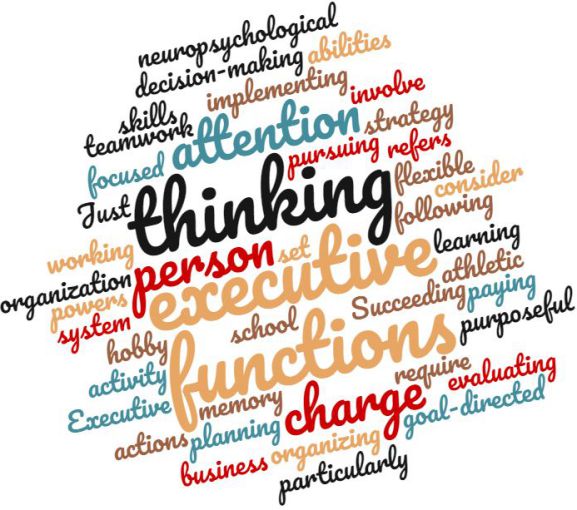How to Think Like a Champ?
Build Executive Function & Working Memory Skills

Executive functions refers to a set of neuro-psychological skills that involve the organization system for thinking. Just as the person in charge of a business has the powers of an executive, each person is in charge of his or her own thinking and actions. Executive functioning abilities include purposeful goal-directed activity, paying attention, evaluating, decision-making, planning, organizing, implementing, and following through. Succeeding in school, pursuing a hobby, learning athletic strategy and teamwork all require executive functions. At The Cognitive Emporium we are particularly focused on the executive functions of attention, working memory, and flexible thinking.
Weak executive function skills such as organization, time management, planning, and initiative cause many students to struggle both in school and in life. Clues pointing to weakness in executive function include not turning in course assignments, inability to plan and prepare for upcoming tests, and inability to complete homework.
Homework related issues are a top complaint among parents and are a major source of conflict in the home. Even if that same student grows up and gets to college because they have had someone helping them manage their weaknesses through high school, suddenly is faced without any support, their inability to cope often leads to failing out of higher education. Instead of support, what a struggling student needs is a coach to show them how to become independent in college and life.
A coach can help to:
- Organize their environment and school materials so they have ready access to what they need, when they need it.
- Generate effective study guides that help them both with class/test preparation and self-monitoring of their learning.
- Teach them to become good notetakers so that their class notes are clear and complete but concise.
- Manage their time so that they can create a balance between homework and study requirements and their other activities.
- Take tests successfully and with confidence.
- Improve executive function skills to enhance recall and increase retention of information.
FIND OUT IF LEARNING DIFFICULTIES ARE AT THE ROOT OF BEHAVIORAL STRUGGLES
If you've suspect that learning difficulties may be at the root of behavioral struggles, we urge you to schedule a complimentary 10 minute phone call with Kyra Minichan, The Cognitive Emporium founder and developer of our unique P.A.T.H. assessment and treatment approach.
Together we will take the first steps on a P.A.T.H. to discover your child's unique superpowers.
Executive Functioning Development in Children
3-4 Year Olds
- Complete simple errands; e.g.: “Get your pajamas from your drawer”.
- Perform simple chores and self-care tasks with reminders and physical assistance if needed; e.g.: clear dishes from table, brush teeth, get dressed.
- Inhibit unsafe or inappropriate behaviors; e.g.: don’t touch a hot stove; don’t run into the street; don’t grab a toy from another child; don’t hit, bite, push, etc.
5-7 Year Olds
- Complete 2-3 step errands; e.g.: “Put your backpack on the step and then bring me your agenda.”
- Tidy bedroom or playroom independently.
- Initiate and perform simple chores and self-help tasks, but may need reminders; e.g.: making their bed, make a bowl of cereal.
- Bring papers to and from school.
- Complete homework assignments (20-minutes maximum).
- Decide how to spend their money.
- Inhibit behaviors; e.g.: follow safety rules, use appropriate language (e.g. not swearing or using bathroom language when not appropriate), raise hand before speaking in class, and keep hands to self.
8-11 Year Olds
- Run errands, including those involving a time delay, such as remembering to bring something home from school without reminders.
- Perform chores that take 10-30 minutes; e.g.: setting the table, dusting.
- Bring books, papers, assignments to and from school.
- Keep track of belongings when away from home.
- Complete the majority of homework assignments without assistance (1 hour maximum).
- Plan simple school projects such as book reports; e.g.: select book, read book, write report.
- Remember changes in daily schedule including different after school activities.
- Save money for desired objects and plan how to earn money.
- Inhibit/self-regulate behaviors; e.g.: maintain composure when teacher is out of the classroom; inhibit temper tantrums and bad manners.
12-14 Year Olds
- Help out with chores around the home, including both daily responsibilities and occasional tasks that may take 60-90 minutes to complete; e.g.: emptying dishwasher, raking leaves, shoveling snow etc.
- Able to safely baby-sit younger siblings.
- Appropriately use a system for organizing school work.
- Independently follow complex school schedule involving multiple transitions with teachers and classrooms. Plan and carry out long-term projects, including tasks to be accomplished and a reasonable time-line to follow.
- Plan time effectively, including after school activities, homework, family responsibilities
- Inhibit rule breaking in the absence of visible authority.
High School Age
- Manage schoolwork effectively on a day-to-day basis, including completing and handing in assignments on time, studying for tests, and creating and following timelines for long-term projects.
- Establish and refine a long-term goal and make plans for meeting that goal; e.g.: collegiate or other vocational goals.
- Independently organize leisure time activities, including obtaining employment or pursuing recreational activities during the summer.
- Avoid reckless or risky behaviors; e.g.: use of illegal substances, sexual acting out, shoplifting, or vandalism.

